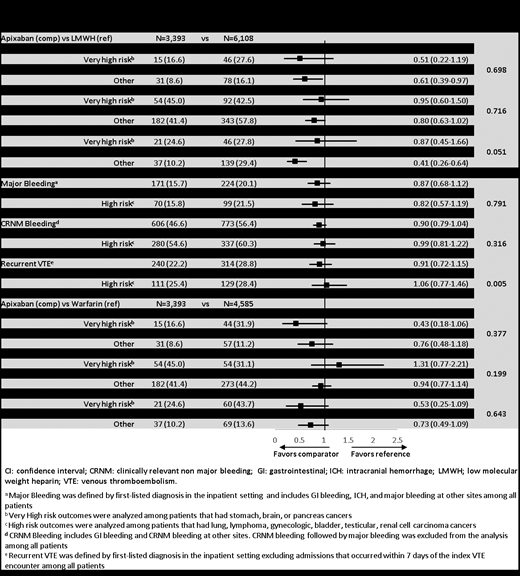
BACKGROUND: Cancer is an independent risk factor for venous thromboembolism (VTE) and the strongest predictor for all-cause and pulmonary embolism-related mortality. VTE risk is 4-7 times higher in cancer patients compared to non-cancer patients. Different cancer types are associated with different risk of VTE. Cancers of the brain, pancreas, stomach, liver, lungs, and kidneys-and hematologic malignancies-have the strongest association with the occurrence of VTE. The Khorana risk score based on the cancer type, blood counts, and body mass index is one of the VTE risk scales to predict the risk of thrombosis in cancer patients. This study evaluates the risk of major bleeding (MB), clinically relevant non-major (CRNM) bleeding, and recurrent VTE (non-fatal and fatal) among VTE patients with active cancer prescribed apixaban, low-molecular weight heparin (LMWH), or warfarin stratified by VTE risk.
METHODS: A pooled study using four US commercial insurance claims databases identified VTE patients diagnosed with active cancer (defined as cancer diagnosis [any stage] or cancer treatment [chemotherapy, radiation, and cancer-related surgery] within 6 months before or 30 days after VTE diagnosis) who initiated apixaban, LMWH, or warfarin within 30 days following the first VTE event (01SEP2014-31MAR2018). Patients were followed to the earliest of: health plan disenrollment, death, index therapy discontinuation, switch to another anticoagulant, study end, or a maximum of 6 months. Stabilized inverse probability treatment weighting (IPTW) was used to balance treatment cohorts. A subgroup analysis using a modified Khorana VTE risk scale (cancer type only) was conducted. Patients were classified as very high risk (stomach, brain, or pancreas), high risk (lung, lymphoma, gynecologic, bladder, testicular, renal cell carcinoma), or other (all remaining cancer types) depending on their cancer type. Cox proportional hazard models were used to evaluate the risk of MB, CRNM bleeding, and recurrent VTE. The statistical significance (P<0.10) of the interaction between treatment and different levels of VTE risk was evaluated.
RESULTS: After applying the selection criteria, 3,393 apixaban, 6,108 LMWH, and 4,585 warfarin patients were identified with mean ages of 65, 64, and 64 years, respectively. After IPTW, all patient characteristics were balanced. Among all VTE cancer patients after IPTW, 15% of patients had very high-risk cancer and 40% patients had high-risk cancer. In the main analysis, apixaban patients had a lower risk of MB, CRNM bleeding, and recurrent VTE compared to LMWH. Warfarin patients had a similar risk of MB, CRNM bleeding, and recurrent VTE compared to LMWH. Apixaban patients had a lower risk of recurrent VTE and a similar risk of MB and CRNM bleeding compared to warfarin (Figure). When stratifying by the VTE risk scale, study findings were generally consistent with the primary analysis and across the different subgroups. No significant interactions were observed for MB or CRNM bleeding (Figure). Two significant interactions were evident for recurrent VTE: apixaban trended towards a lower risk of recurrent VTE compared to LMWH across all three subgroups, but the magnitude of the difference was larger in the other cancer group vs. very high risk and high risk cancer groups. For warfarin vs. LMWH, different trends in recurrent VTE risk were observed among patients with different VTE risk levels (Figure).
CONCLUSION: Across subgroups of VTE cancer patients with different VTE risk levels, apixaban had a lower risk of recurrent VTE compared to warfarin and a lower risk of MB, CRNM bleeding, and recurrent VTE compared to LMWH consistent with the overall results. Warfarin patients had a similar risk of MB and CRNM bleeding compared to LMWH. Further studies are needed to evaluate the role of anticoagulants in high-risk subgroups of VTE cancer patients.
Cohen:Aspen: Consultancy, Speakers Bureau; CSL Behring: Consultancy; Bristol-Myers Squibb: Consultancy, Honoraria, Membership on an entity's Board of Directors or advisory committees, Research Funding, Speakers Bureau; ONO: Consultancy, Membership on an entity's Board of Directors or advisory committees; Pfizer: Consultancy, Membership on an entity's Board of Directors or advisory committees, Speakers Bureau; Leo Pharma: Consultancy; Guidepoint Global: Consultancy; TRN: Consultancy; Boehringer-Ingelheim: Consultancy, Speakers Bureau; UK Government Health Select Committee: Other: advised the UK Government Health Select Committee, the all-party working group on thrombosis, the Department of Health, and the NHS, on the prevention of VTE; Temasek Capital: Consultancy; Boston Scientific: Consultancy; Bayer: Consultancy, Honoraria, Membership on an entity's Board of Directors or advisory committees, Research Funding, Speakers Bureau; Sanofi: Consultancy, Membership on an entity's Board of Directors or advisory committees; Portola: Consultancy, Membership on an entity's Board of Directors or advisory committees, Speakers Bureau; Daiichi-Sankyo: Consultancy, Membership on an entity's Board of Directors or advisory committees, Speakers Bureau; Lifeblood: Other: advisor to Lifeblood: the thrombosis charity and is the founder of the European educational charity the Coalition to Prevent Venous Thromboembolism; Johnson and Johnson: Consultancy, Membership on an entity's Board of Directors or advisory committees, Speakers Bureau; GlaxoSmithKline: Consultancy, Speakers Bureau; AbbVie: Consultancy; GLG: Consultancy; Medscape: Consultancy, Speakers Bureau; McKinsey: Consultancy; Navigant: Consultancy; Takeda: Consultancy; ACI Clinical: Consultancy. Keshishian:STATinMED Research: Other: I am a paid employee of STATinMED Research which is a paid consultant to Bristol-Myers Squibb Company and Pfizer Inc.. Lee:Pfizer Inc.: Employment, Equity Ownership. Wygant:Bristol-Myers Squibb Company: Employment. Rosenblatt:Bristol-Myers Squibb: Other: Stock Owner ; Bristol-Myers Squibb Company: Employment. Hlavacek:Pfizer Inc.: Employment. Mardekian:Pfizer Inc.: Employment. Wiederkehr:Pfizer Inc.: Employment. Sah:STATinMED Research: Other: I am a paid employee of STATinMED Research which is a paid consultant to Bristol-Myers Squibb Company and Pfizer Inc.. Luo:Pfizer Inc.: Employment.
Author notes
Asterisk with author names denotes non-ASH members.

This icon denotes a clinically relevant abstract


This feature is available to Subscribers Only
Sign In or Create an Account Close Modal